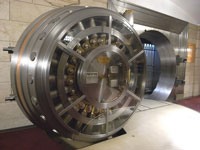

With a CDAn investment choice at most banks where you agree to deposit a specific amount of money for a fixed period of time (this is called the maturity). By agreeing to keep your money at the bank for a certain length of time, the bank usually pays you an interest rate higher than savings and Money Market accounts., you agree to deposit a specific amount of money for a fixed period of time (this is called the maturity). In return, your financial institution agrees to pay you interest (usually higher than regular savings accounts) over this period. However, you will have limited opportunities to access these funds so only use CDs for cash you don’t anticipate needing until after your CD matures.
Your bank will offer you many different maturities or terms for CD’s: 3 months, 1 year, 2 years, 5 years, etc. Generally you will find that the longer the term of the CD, the greater the interest rate you earn. However, there is a catch: if you lock your money in at today’s CD low rates, and then rates go up quickly, you’ve missed out on the higher rates.
When you buy a CD you are locked into that interest rate for the life of the CD. If you take out your money before the full term, the bank will charge you a penalty so make sure you understand the term and the penalties involved if you suddenly need the cash and you have to “bust” your CD. Also, consider which direction you think interest rates are heading. If interest rates are very low, don’t lock in a low rate for 5 years! You can’t just bust your CD and then buy a new one with a higher interest rate if you’re current CD hasn’t matured yet.
On the flip side, you are practically guaranteed of getting a fixed rate of interest on your money for the complete term of that CD. So, if rates are high, then it might be wise to lock in the higher rates for longer terms.
The last time there were really high interest rates in the U.S. was the 1980’s when the rates on CD’s were as high as 18%! Now, however, interest rates for CDs are very low: 2% for a one year CD and just 3% for a five year CD.
Money Market Accounts (MMAs)
These accounts are designed to be a combination of the features of a classic savings account and a CD. Some typical features include:
- Higher interest rate than classic savings accounts
- No maturity date as with a CD
- A minimum balance that must be maintained (e.g., $2,500)
- Limited withdrawals each month (typically up to six transactions per month)
Do not confuse bank MMAs with the similarly named accounts offered by investment firms. They are very different. Bank MMAs are another form of savings account and carry the federal insurance, currently up to $250,000 per depositor, which all other deposit accounts enjoy. The similarly named product offered by investment houses is typically a short-term investment in one or more mutual funds that may or may not generate positive earnings. There is also no federal insurance protecting your principal (investment).
When you have one of these savings accounts, you are really “loaning” your financial institution your money. In return, the bank or credit union pays you interest for making these loans. Unlike most loans, however, you are usually guaranteed repayment; even if your institution fails. In case of the bank’s failure, the free federal insurance you receive covers the loss.
